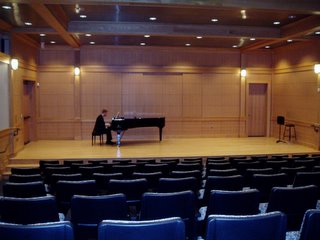 Engaged in the annual springtime delusion that I'm going to turn my 2.5-mile regular power walk into a jog. (Don't be too impressed - so far that means that I walk up the hills and run down them.) I have an iPod playlist just for this purpose, and it doesn't contain anything that comes close to the music I work with for a living. The purpose is to deactivate my left brain and provide an irresistible groove. A tight rhythm section, some good acoustic guitar or piano, lyrics that make me smile. The perfect spring-cleaning song in today's shuffle - Inside Of My Head (David Wilcox).
Engaged in the annual springtime delusion that I'm going to turn my 2.5-mile regular power walk into a jog. (Don't be too impressed - so far that means that I walk up the hills and run down them.) I have an iPod playlist just for this purpose, and it doesn't contain anything that comes close to the music I work with for a living. The purpose is to deactivate my left brain and provide an irresistible groove. A tight rhythm section, some good acoustic guitar or piano, lyrics that make me smile. The perfect spring-cleaning song in today's shuffle - Inside Of My Head (David Wilcox).
The Bassi Speak
A comment posted on this blog a week or so ago:
"A question for you about us big, heavy voices that take years to develop - how do you recommend we find opportunities? I'm a basso profundo, so I'm looking at just hitting my stride in my late 20's. Of course, when you're 30 it's too late to win a Met competition, and young artist programs still seem to have this prejudice for younger instruments. But the rungs of this business are set up for people to finish their degree(s), hit the YA circuit, and then try for covers or comprimari - and it seems beyond the pale for some companies that a singer might miss a rung or two.So what's a low bass to do? How do we deal with the "end of the great big American voice" syndrome?"
I polled some of my favorite basses. Here's a composite response.
Degrees
Music schools are a great umbrella protecting a young bass from the "real" world. (NOTE: a bass is still "young" in his late twenties!) You can build up a lot of concert, recital, as well as operatic repertoire, all under the watchful eye of your "team" of teachers and coaches.
Find a way to extend the schooling -- you'll always be a commodity if you're a low bass at a school, and it's a lot of fun being needed (more fun than being one of every bass in New York, 20 to 75 years old, auditioning for the same role).
Find a degree program that won't require a loan and then revel in that program's offerings; stretch out the time -- it's not a race to get out, particularly for a bass. You'll get more stage time (invaluable, in my opinion) and more studio time.
Outreach
Create opportunities to sing in any capacity wherever possible. For me, the greatest benefit came from singing outreach/runout shows for a local opera company for a number of years while in my twenties. I proved to myself that I could sing in the morning, and it provided a daily dosage of excited, energetic audience of elementary school students. There is no better way to develop the voice than to use it every day! And there is also no better way to get comfortable onstage than to sing a lot, particularly when the role is in English.
YAPs
This country has seen an enormous surge of young artist programs in the last decade, and just about all of them will be looking for a bass each year.
Many YAPs have a prejudice for younger instruments, but I promise that a bass that sings consistently through his natural vocal range could just about write his ticket into any program he chooses.
Be smart about finding YA programs that actually put their YA's on stage in smaller roles. Granted, sometimes having to do your 14th performance of Ceprano sucks big time, especially if you consider Sparafucile and Sarastro more up your alley. But being a bass "saved my ass," because I would have absolutely HATED doing all that language work, music study, role memorization, movement and acting work, etc., and only occasionally put it to test. Even in the smallest roles, at least I was on stage constantly through my 20's.
A young bass is actually at an advantage. Even if you are miles away from your "prime" there are a million roles you could do.
Young basso profundi (as well as dramatic types) presumably already have a sizable voice, even if it's rough around the edges. For that type of voice, it would seem logical to look at young artist programs that are attached to big houses ("big" as in "cavernous auditorium") and who look to the young artists for actual mainstage work (generally to save money). If (again presuming a future "dramatic" singer already has a large, if unhewn, voice) these companies do in fact use their young artists on the main stage, they would love to save money by using a young basso as a second armored man or as one of the 25 bass comprimario roles in a Verdi opera. If you have a loud voice and a middle C, you're on.
The Met Competition
I wouldn't worry about the Met competitions, unless you are a once-in-a-lifetime voice. The cutoff age of 30 is just about impossible for a bass to truly compete with other voice types. To start with, the bass repertoire has very few show-stopping arias compared to any of the other voice types, so you have that working against you, too!
Roles
Take any greatest hits operas and I'll show you how many roles for bass there are, smallest to biggest... just off the top of my head: Rigoletto has Ceprano, Marullo, Sparafucile... Traviata has the "Cena e pronta" guy, the Doctor, Marquis and Baron... Flute: Armored Guy, Sprecher, Sarastro (more and more Papageno too these days)... Nozze di Figaro: Antonio, Bartolo, Figaro... Don G: Masetto, Commendatore, Leporello, Don Giovanni... Romeo has Capulet and Friar... Boheme has Benoit, Alcindoro, Colline (sometimes Schaunard)... Don Carlo has at least 2 bass roles smaller than Phiilip, Tanhaeuser has 2 smaller than Landgraf, Sampson has 2 mid sized roles, Midsummer has 3 smaller than Bottom... anyway, you get my point.
USUALLY the smaller roles can be done with ANY type of bass, be it "profundo" or cantante or bass/bari or buffo or whatever... additionally, they can almost ALL be sung by a bass in his "natural" voice (as compared to the small roles for tenor, which tend to be pretty "sprech-y" and "barky" right?)
In virtually any given season at virtually any given opera company, I PROMISE there are more good-singing small opportunities for young basses than for any other young voice type.
The Buffo Question
Another option would be to embrace stage craft and dive into some character stuff. This basically requires the ability to let go of the thought that every sound a bass makes has to sound like Kurt Moll -- if you're 25, it's okay to sound 25. And, if you're singing Bartolo, it's okay to not sound gloriously Rene Pape-like on your high e's. Figure out how to lighten up and sing up to an e, and buffo is a cakewalk.
In the young artist world there aren't any old basses around to sing the buffo stuff. If a company's gonna perform Don Pasquale, then some young singer is gonna have to don some aging make-up. If they're gonna do Barber of Seville, someone's putting on a fat suit. May as well be you -- you'll be making money while being on stage.
If you can follow a conductor while singing patter, you can follow a conductor anytime. Now, most basses tremble at the thought of being pigeon-holed and labeled "buffo," but if this you're an actual profundo, ain't nobody gonna care if you did a Pasquale in Des Moines when you were 25.
Finally...
Consider yourself lucky that you have a rare voice type. If you can make it through the "growing pains" of the voice type, then your chances for a career are better than most. Find a good teacher, be a good colleague, learn languages, study music/art, and get onstage as much as possible. Understand that life, like singing, is simply a "work in progress".
Laying Low
Thanks, guys. Love having other people do my work for me.
Expect a few weeks with pretty lame blog content. I'm a little fried. Putting one foot in front of the other, trying to carve a few work-free hours out of every day, knowing that I have about 6 weeks to recharge before the summer steamroller hits me.
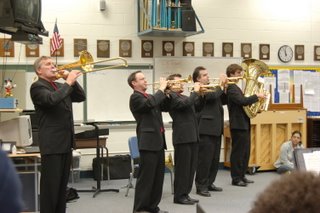 Boston Brass did more than just show up at our two school presentations today - they were absolutely terrific.
Boston Brass did more than just show up at our two school presentations today - they were absolutely terrific.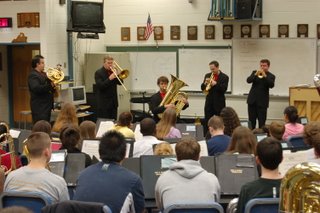 11:00am at Robinson Secondary School in Fairfax. Midday by high school standards, but pretty much the crack of dawn for performers whose professional day usually runs from mid-afternoon till about midnight. The gentlemen were energetic, focused, and committed to communicating with the roughly 130 teenage musicians in the room. Advice on practicing, sight-reading, stage fright, and making music with friends - all interspersed with spot-on playing that belied the "early" hour.
11:00am at Robinson Secondary School in Fairfax. Midday by high school standards, but pretty much the crack of dawn for performers whose professional day usually runs from mid-afternoon till about midnight. The gentlemen were energetic, focused, and committed to communicating with the roughly 130 teenage musicians in the room. Advice on practicing, sight-reading, stage fright, and making music with friends - all interspersed with spot-on playing that belied the "early" hour.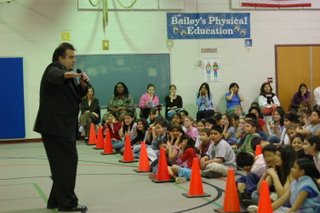 2:00pm at Bailey's Elementary School in Falls Church. About 250 students in the gym, and the presentation shifted to raucous audience involvement (a couple hundred kids practicing a brass instrument "buzz" is an awesome sound) and giggle-inducing comedy (Bugs Bunny's got nothing on these guys.)
2:00pm at Bailey's Elementary School in Falls Church. About 250 students in the gym, and the presentation shifted to raucous audience involvement (a couple hundred kids practicing a brass instrument "buzz" is an awesome sound) and giggle-inducing comedy (Bugs Bunny's got nothing on these guys.)






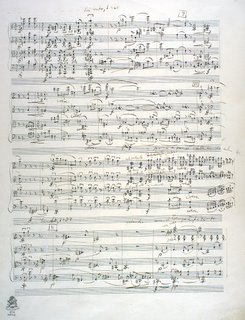

 “This server is currently experiencing a problem. An engineer has been notified and will investigate.”
“This server is currently experiencing a problem. An engineer has been notified and will investigate.”